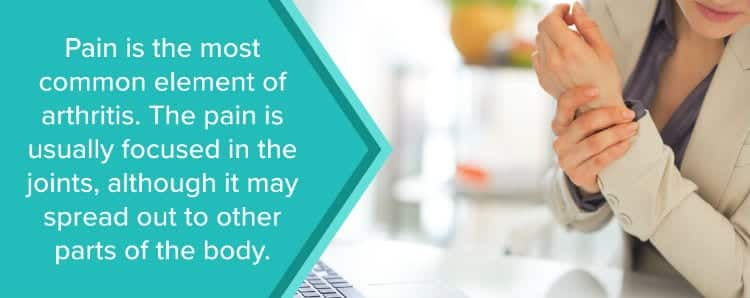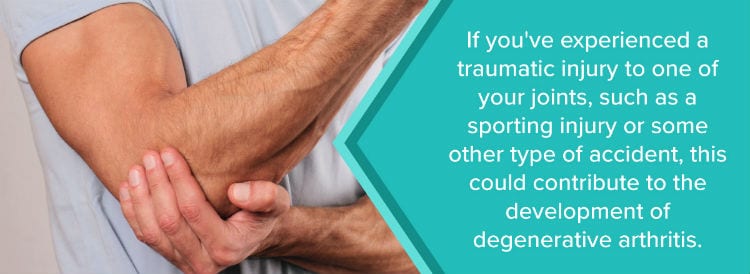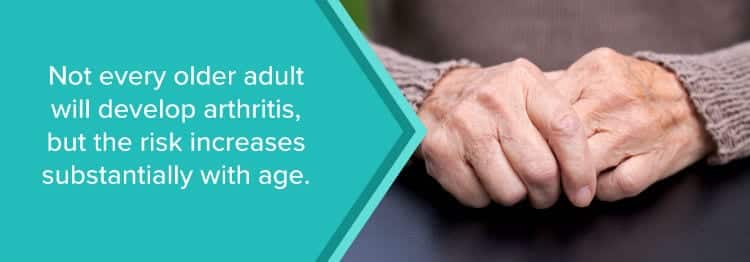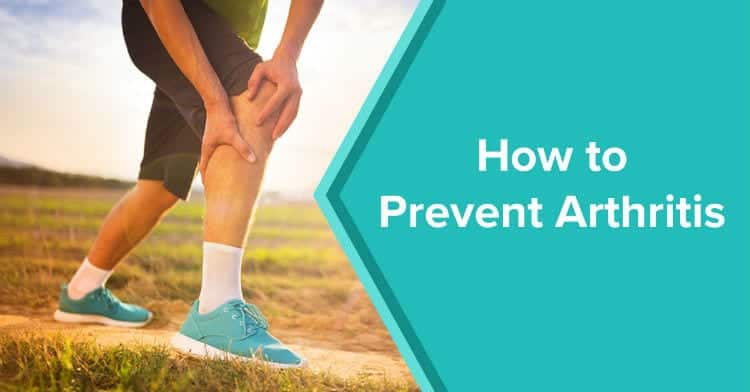When it comes to arthritis, there are some widespread misconceptions about it. Many people might think arthritis is something that happens to random individuals without any rhyme or reason. There’s no preventing it, and you’ll either develop it or you won’t. Others might think it’s entirely genetic, and so the chances of developing it are deciding by our family history.
Maybe you’re a long-time arthritis patient. Maybe you’re just beginning to feel stiffness in your joints, and you’re wondering if you might be experiencing the beginnings of arthritis. Or maybe you’re just curious, and you’re wondering if there are any steps you can take to prevent yourself from developing this condition in the first place.
Whatever the case may be, it’s always best to be well-informed. That’s why NJ Spine and Ortho put together a guide to arthritis. Here, we’ll talk about what it is, what causes it and what steps you can take to prevent yourself from developing it, or else what steps you can take to help lessen your symptoms.
What Is Arthritis?
Did you know that arthritis isn’t just one single condition? Even though we often use the term generically to describe any joint pain associated with inflammation, it describes roughly 200 different conditions and diseases that affect the joints and the surrounding areas.
Arthritis is a highly common condition that usually affects adults over the age of 65, but it can affect anyone. It’s so common, in fact, that 52.5 million adults report suffering from some form of it, according to the Center for Disease Control (CDC). Some of the most well-known types of arthritis are osteoporosis, rheumatic disease and systematic connective tissue disorders, but there are many more varieties.

What Are the Symptoms of Arthritis?
The symptoms of your arthritis will vary widely depending on which type of arthritis you have. The patterns will likely be quite different, as will the location and the severity of the pain and the other symptoms that may accompany the pain.
Despite the great potential for diversity in symptoms, however, there are four main symptoms present in almost every variety of arthritis.
- Pain
Pain is the most common element of arthritis. The pain is usually focused in the joints, although it may spread out to other parts of the body. It may be limited to only one joint, or it may be affecting many joints throughout the body.The pain may develop gradually, or it may come on very suddenly. It may be a constant pain, or it may come and go as triggered by certain activities that over-exert the affected joint. - Swelling
Most types of arthritis will cause noticeable swelling to the affected joint. The skin may become red and warm to the touch. The swelling might be very significant, or it may be very minimal.This swelling may last as long as the pain, or it may come and go as triggered by outside factors. It is likely to flare up for periods of time in coordination with the pain. - Stiffness
Stiffness is a classic arthritis symptom that is present in almost every form of arthritis. The affected will begin to “creak” when they move. Movements may become slow, and range of motion may be limited.The stiffness may be worse in the mornings, or after prolonged periods of stillness, such as after sitting at a desk or in the car for a long time - Difficulty Moving a Joint: This symptom is very similar to the stiffness in the joints. Moving from one position to another may become painful. Some motions may become impossible due to a growing lack of flexibility, and the amount of pain certain movements may cause.Other symptoms will vary from one type of arthritis to the next, but they may include numbness or tingling in the joints, difficulty sleeping and grating sounds whenever the affected joint moves.
What Causes Arthritis?
It’s difficult to determine one single cause for arthritis. This is partly because there are so many different types of arthritis, and partly because in any given type of arthritis, there are multiple factors at play. There are, however, some commonalities and general trends across the spectrum.
- Injury: If you’ve experienced a traumatic injury to one of your joints, such as a sporting injury or some other type of accident, this could contribute to the development of degenerative arthritis. The process of healing from an injury is very strenuous for the body, and it can cause the joint to break down faster than it would ordinarily. Besides this, the joint may not have healed correctly after the injury and may be more susceptible to developing arthritis later on.
- Genetics: Not every type of arthritis is genetically inherited, but some of them are. One such type is osteoarthritis. This is a kind of arthritis that causes a reduction of cushioning cartilage in the knees at a much faster rate than usual. The genetic predisposition for this is often passed through families.
- Poor Diet: This is often the cause for types of arthritis like gout or pseudogout. These kinds of arthritis are directly caused by diets that contain lots of high-purine foods, like meats, seafood and red wine. Overeating of these kinds of food can trigger gout.
- Infections: Some types of arthritis, such as arthritis related to Lyme’s disease, can begin with an infection before developing into arthritis in their own right.
- Immune System Dysfunction
Problems with the immune system can be a cause of some types of arthritis, such as rheumatoid arthritis or systematic lupus erythematosus.

Risk Factors
Anyone has the potential to develop arthritis at some point in their life. Some may develop it when they are older, some may experience it early in life, while still others may never develop it at all. However, some definitive factors have been isolated over the years that raise a person’s risk for arthritis.
Factors that increase your risk of arthritis include but are not limited to:
- Genetics
If your parents, grandparents, aunts and uncles have all had trouble with arthritis, there’s a high probability that you will as well. Not every type of arthritis has a genetic component, but some do. Often, if you have a genetic predisposition to arthritis, you may be more susceptible to environmental factors that could cause you to develop the disease. - Age
Even though anyone has the potential to develop arthritis at any point in their lives, there is a definite link between age and arthritis. Not every older adult will develop arthritis, but the risk increases substantially with age. - Sex
Your sex might be a factor when it comes to developing different types of arthritis. Overall, women are more likely to develop arthritis than men. However, it’s important to note that the statistics vary depending on which type of arthritis you examine. For example, most patients with rheumatoid arthritis are women, while most patients with gout (another common type of arthritis) are men. - Obesity
If your body is carrying around a significant amount of extra weight, this is putting additional stress on some of your joints. In particular, this stresses your hips, knees and spine. This puts you at a much higher risk of developing arthritis. - Previous Injuries
If you have ever had an injury in a joint, there’s a high probability that you’ll eventually develop arthritis in that joint in the years to come. This could be because things didn’t heal the first time correctly, or because the joint may degenerate faster as a result of having had the injury. - Occupation
Some jobs require frequent bending, squatting and other motions that are hard on the knee joints. If you work in a job like this, you will probably be at a higher risk for knee osteoarthritis. Similarly, certain jobs that require you to make repetitive motions with your hands and wrists can make you more susceptible to developing arthritis in the wrist joints.

Prevention
Some of the factors that increase your risk of arthritis are out of your control. You can’t reverse a previous injury, you can’t help your genetics and you certainly can’t control your age. However, there are some steps you can take to put yourself ahead of the game and make yourself a less likely candidate for arthritis.
- Eat More Fish
Certain types of fish like salmon, trout and sardines are especially rich in Omega-3 fatty acids. These are healthy poly-saturated fats that are known to have many health benefits. One of those benefits includes reducing inflammation in the body. Women in particular who eat fish with a high number of Omega-3s will be at a lower risk for rheumatoid arthritis. - Maintain a Healthy Weight
We mentioned that obesity was a risk factor that contributed to arthritis. Because of that, if you’re looking to prevent arthritis, keeping your weight at a healthy level is an excellent way to do that. Not only will this lower your risk for arthritis, but there are plenty of other health benefits to being a healthy weight as well.By eating a well-balanced diet and getting plenty of exercise, you can bring your weight to a healthy range for your body and help decrease the amount of stress on your joints. This will make you less likely to develop arthritis in the long run. - Exercise
This fits well with number 2. Exercise is a great prevention technique because it can help you lose weight and take some extra stress off your joints. Not only that but exercising also strengthens the muscles surrounding your joints which helps give them an extra level of protection against the wear and tear that often leads to arthritis.Your exercise will be the most useful if you mix it up. Alternate your aerobic exercises like swimming and running with strength training. Flexibility training is also an excellent idea, as this will help keep your joints limber, flexible and less susceptible to injury. - Try to Avoid Injury
This might be an obvious one, but it’s still worth mentioning. Injuries can lead to arthritis through joints not healing correctly or through them wearing out faster. You’ll want to avoid injuries for the other health benefits as well, but particularly because of the role they play in developing arthritis.Always be sure to wear protective equipment when playing sports or engaging in other potentially dangerous activities. Make sure to stretch before and after exercising and always take the time to learn the correct form and technique of any activity to avoid injury. - Be Good to Your Joints
The better you take care of your joints, the better they can take care of you. This means doing things like bending at the knees to lift heavy objects instead of bending at the waist. It means carrying heavy items close to your body to take the strain off your wrists. It means being careful of the positions in which you sleep.Another thing you can do to help your joints is to stand after you’ve been sitting for extended periods of time. If you have a desk job, take breaks every so often to stand, stretch and take a short walk. - Enjoy a Drink
Studies have begun to link drinking moderate amounts of alcohol to multiple health benefits, like a lower risk for heart disease. One recent study suggests that this may extend to lowering one’s risk for rheumatoid arthritis.The research is far from complete, but the results seem to indicate the health benefits of enjoying a moderate amount of alcohol. Of course, drinking to excess isn’t good for anyone’s health, and it’s always best to consult your doctor and see if this is safe for you. - Pay a Visit to Your Doctor
One of the best steps you can take to prevent arthritis is to visit your doctor and talk to them about it. Your doctor may have valuable advice on how to treat your arthritis and prevent further damage from occurring.Even if you only think you’re starting to develop arthritis, it’s worth the visit. Because arthritis causes progressing amounts of damage, it’s better to visit sooner and get started on treatment right away. Waiting could mean risking more damage to the affected joints.

Take Control of Your Health
Arthritis isn’t an entirely preventable disease. Some of us are always going to be more susceptible to it than others. We may have a genetic pre-disposition, we may have to work at a desk all day, or we may simply be getting older.
Don’t let this discourage you. There are so many ways you can take control of your own health and take steps to relieving your arthritis symptoms. NJ Spine and Ortho is also here to help.
Maybe you haven’t developed arthritis yet, and maybe you never will. But these are still great tips and great measures you can take to keep your body healthy and functioning properly.
Eating well, exercising regularly, avoiding injury and visiting your doctor are all great ideas regardless of whether or not you think you might be developing arthritis. By following these steps, you’ll soon be well on your way to a healthier you.

